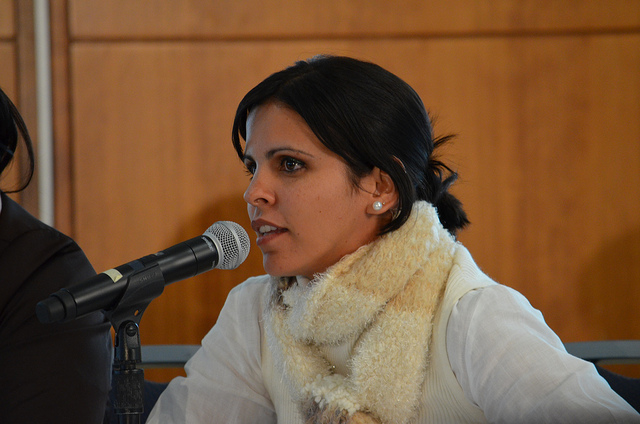
StartUp Cuba, one entrepreneur at a time
Photo: Cuban entrepreneur Yamina Vicente, Decorazón (2013 photo). Credit: Center for Democracy in the Americas (CDA) on Flickr.
If a journey of a thousand miles begins with a single step, perhaps a significant economic and social opening might gain footing in Cuba with the success of Sandra Aldama’s soap micro-business, or Marianela Pérez’s Pizzeria Nella.
They — along with Niuris Higueras, owner of the Atelier restaurant, Yamina Vicente, who owns Decorazón, an event planning business, and Deciré Verdecia, owner of Decy Spa and Hair Salon, all located in or around Havana — are part of a generation of enterprising cuentapropistas, the self-employed, a budding sector in the Cuban economy that began to emerge after the government decided to allow private business ventures in 2008.
The five businesswomen were part of “StartUp Cuba?,” a conversation at Miami Dade College Friday morning. The event was co-sponsored by the college’s Idea Center and the Center for Latin American and Caribbean Initiatives, with the assistance of the Cuba Study Group.
The Cuba Study Group initially brought the entrepreneurs to attend the annual convention of the Association of Studies of the Cuban Economy as well as other academic and professional activities related to their various lines of business in Cuba. It’s another sign of Miami’s importance as a center of entrepreneurship.
As noted by The Miami Herald in a story in a February 2014, a report by the Cuban Labor Confederation showed that jobs in the public sector in Cuba have fallen by 596,500 since 2009, part of efforts by the government to cut public spending.
But when asked why they chose cuentapropismo the entrepreneurs had both, practical and idealistic answers.
Aldama, who was trained as an educator and also worked for the Ministry of Culture for five years, said she jumped at the opportunity once there was an opening in the economy to create personal business. “It’s not just about the financial aspect,” she explained. “It’s motivational too. It’s about putting your energy on something in which you see results and have a personal meaning. Personally, I don’t think I’ll ever go back to the state sector.”
Vicente, a university professor turned event planner, made the point that in Cuba there are no legal restrictions regarding having a state job and a personal business at the same time.
“We are clear that the primary motive to migrate from the state to the private sector is financial,” she said. “But I believe there are other reasons too. As self-employed, we run a business that is smaller, more efficient, and that makes for better communication and the worker feel … more motivated.”
The entrepreneurs all spoke of working out of their homes (D’Brujas, Aldama’s soap business, actually also has a store in Habana Vieja) and either having initial capital or embarking on a business that required little investment, such as event planning. They all also shared a learning-by-doing approach.
“Once there was an opening, I think like most people, I jumped and it was all empirical [learning],” explained Higueras, the restaurateur. “In my case, I had had an experience of having a restaurant with my brother. And I have a passion for cooking and I knew one day I was going to have my own restaurant.”
She attended CubaEmprende, a program offered by the Catholic Church, which teaches subjects such as marketing, administration and customer service.
The route was different for Vicente, who studied economics.
“I have an older sister who is a photographer and her work complemented my idea of organizing events,” she said. “I love design and manual arts and this was a business that would not demand a lot of capital to start.”
But, she cautioned, “None of us around this table is actually a business. We don’t have yet legal status as companies. We are individuals authorized to be self-employed, por cuenta propia. Legally, Decorazón or Atelier [the restaurant] or D’Brujas [the soap manufacturing and sales business], don´t exist as companies.”
Regardless, at times the conversation suggested a Capitalism 101 discussion, dealing with matters such as human resources, supply chains, marketing, regulations and taxes.
However, Juan Antonio Blanco, executive director of the co-sponsoring Center for Latin American and Caribbean Initiatives and a host for the panel, explained that he called the panel “StartUp Cuba?” with a question mark because “while there are things happening in Cuba that were not happening 10 years ago, can we compare the business sector [in Cuba] to that of other countries. The answer is: not yet.” And the success of these developments, he said, “will not be determined by the number of people getting licenses for self-employment but the judicial and institutional ecology needed for business…. And with this I am not putting down or dismissing any of the positive things we’ve heard here today. I’m just saying, Let’s not shoot the fireworks yet. We have not arrived yet. The question is what’s next?”
But Tomás Bilbao, executive director of the Cuba Study Group, which invited the five entrepreneurs, noted that “after spending 10 days with these women I wouldn’t put a question mark to any of their businesses. In fact, I’d say we should put an exclamation point next to them. The obstacles exist and are obvious, but of all the things we can learn from them, we can learn some optimism.”
Fernando González is a Miami-based arts & culture writer.
Recent Content
-
Communitiesarticle ·
-
Communitiesarticle ·
-
Communitiesarticle ·


